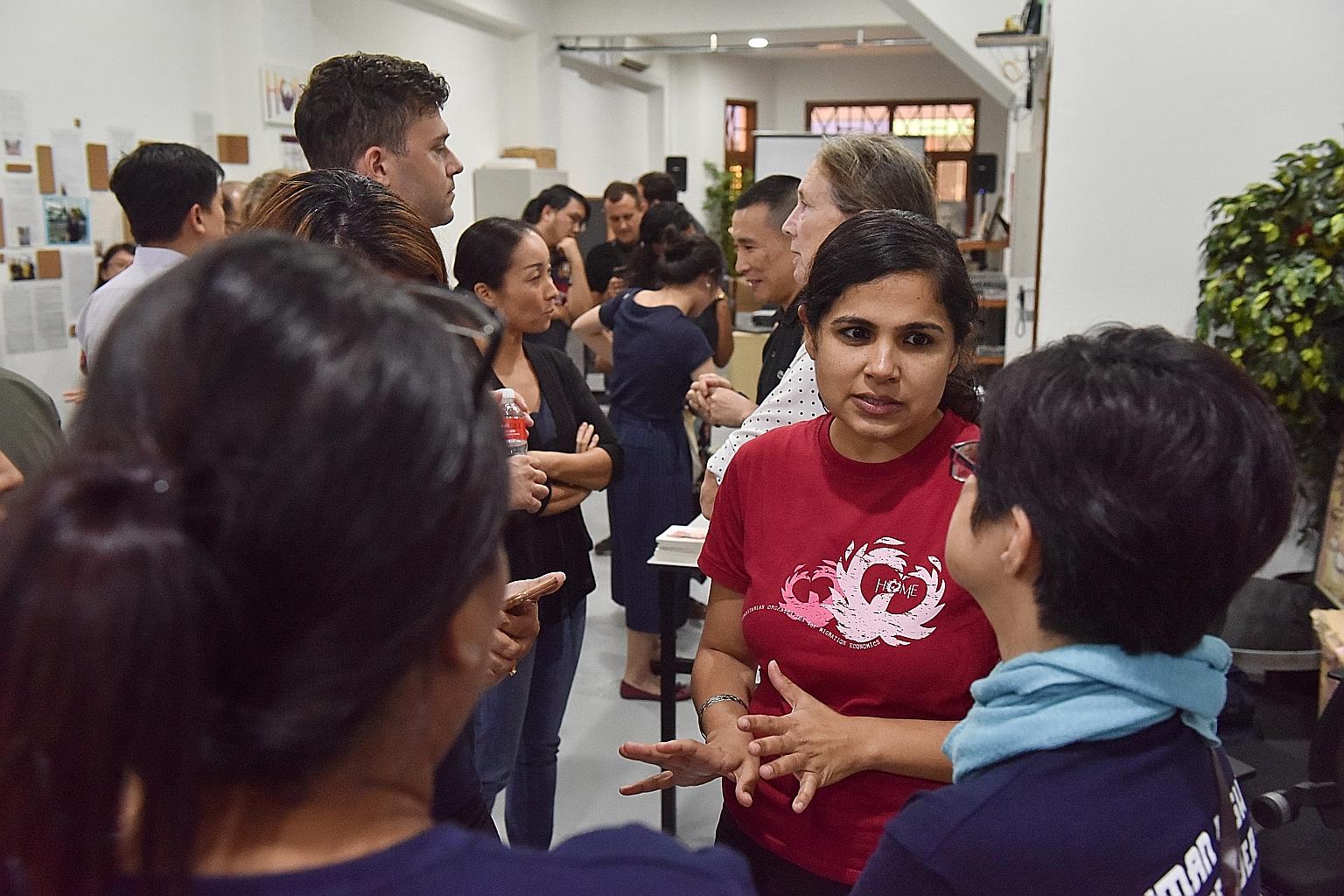Report suggests maids at risk of forced labour
Manpower Ministry disputes finding by rights groups, says report doesn't accurately reflect working conditions
Sign up now: Get ST's newsletters delivered to your inbox

Ms Sheena Kanwar, Home's executive director, talking with participants at an event yesterday to launch the report by the group and Hong Kong-based anti-trafficking group Liberty Shared on forced labour in Singapore's domestic work sector.
ST PHOTO: JASMINE CHOONG
Domestic workers who seek help over their work conditions mostly do so for reasons such as overwork, verbal abuse and salary issues - and many of their complaints appear to be "strong indicators of forced labour", a new report released yesterday said.
The report by the Humanitarian Organisation for Migration Economics (Home) and Hong Kong-based anti-trafficking group Liberty Shared looks at forced labour in Singapore's domestic work sector. Forced labour is work or services exacted from a person "under the menace of any penalty and for which (he) has not offered himself voluntarily", according to the International Labour Organisation (ILO).
Responding to the report, a Manpower Ministry (MOM) spokes-man said it "does not accurately reflect the employment and working conditions of foreign domestic workers (FDWs)" here. It said forced labour is a complex issue. "Meeting one or more of the ILO forced labour indicators may not necessary mean that a worker is indeed in a forced labour situation."
The ministry added that Singapore's Prevention of Human Trafficking Act is aligned with the United Nations' Trafficking in Persons Protocol, that the Republic ratified in 2016.
The report said based on casework data from Home, out of 2,832 complaints it received from April 2017 to March last year, 483 were related to overwork. In this period, it saw an average of 17 new runaways and, in the past year, it provided shelter to over 800 FDWs. There were around 250,000 FDWs in Singapore as of June last year.
"It is not uncommon for domestic workers to report working hours that range from 16 to 18 hours a day... with the (FDW) also not having any rest days," said the report. "As there is a live-in requirement for (FDWs), those who look after the elderly or young children may be on call 24/7."
Surveillance cameras, which are "common" in homes, make it hard for workers to take breaks without express permission by employers, it added. Other issues include being asked to do tasks not traditionally viewed as domestic work, such as giving employers massages or working illegally in their business.
The second-most common complaint among FDWs was verbal abuse, of which there were 472 cases. These include threats and insults, as well as sexually-loaded insults such as being told: "You are no better than a prostitute."
Pay issues were the next most common, at 342 reported grievances. These include unpaid or delayed salaries and deductions, including for employer obligations like medical expenses. Some employers "safekeep" FDWs' pay too.
-
More protections suggested
• Extend Employment Act to migrant domestic workers so they have regulated working hours, sick leave and limits on overtime, among other rights.
• Amend the Prevention of Human Trafficking Act to clearly define "forced labour" and "exploitation", so cases are investigated in line with international standards.
• Allow foreign domestic workers to switch employers freely with clear notice periods. Currently, such workers are reliant on their employers' consent to do so.
• Reform and abolish the $5,000 security bond conditions so there is no "undue financial burden on employers" to ensure they control and supervise their foreign employee.
• Shift to a zero recruitment fee model so that domestic workers do not end up paying large sums for overseas placements, in the form of salary deductions, leaving them dependent and in debt.
Recent policy changes deal with a part of this, with MOM introducing a new Work Permit condition from this year that disallows employers from "safekeeping"money.
The report also flagged conditions that leave FDWs vulnerable.
"The lack of guaranteed minimum wage, exclusion from the Employment Act, along with the non-mandatory employment contract and insufficient guidelines on working conditions... leave (them) vulnerable to different forms... of labour exploitation and abuse," said Ms Sheena Kanwar, executive director of Home, and Ms Archana Kotecha, Asia director for Liberty Shared. While "anti-trafficking legislation exists, this is in no way a substitute for fundamental labour protections", they said.
MOM, in its reply, said FDWs are generally happy working in Singapore, and the claim that they lack legal protections here "cannot be further away from the truth".
It said although FDWs are not covered under the Employment Act as stipulations such as fixed work hours cannot be simply applied in a home environment, they are covered under the Employment of Foreign Manpower Act.
This law requires employers to provide adequate rest, proper accommodation and medical care, among others, to FDWs, although Home contends that this is "ambiguous language".
The ministry also said a "very small number" of FDWs run away from employers, with the majority of cases due to misunderstandings. Abuses are an "even smaller minority", it added.


